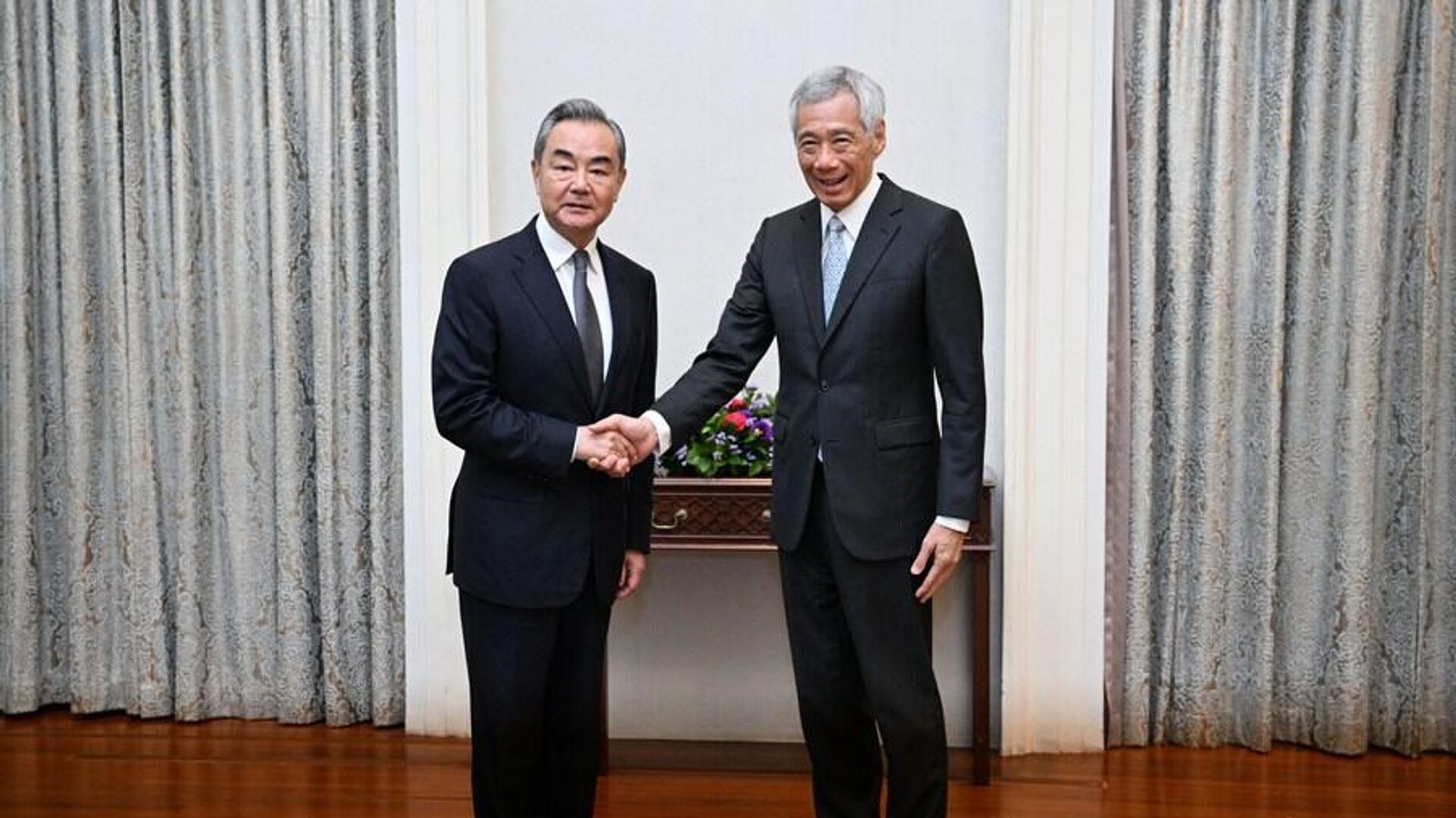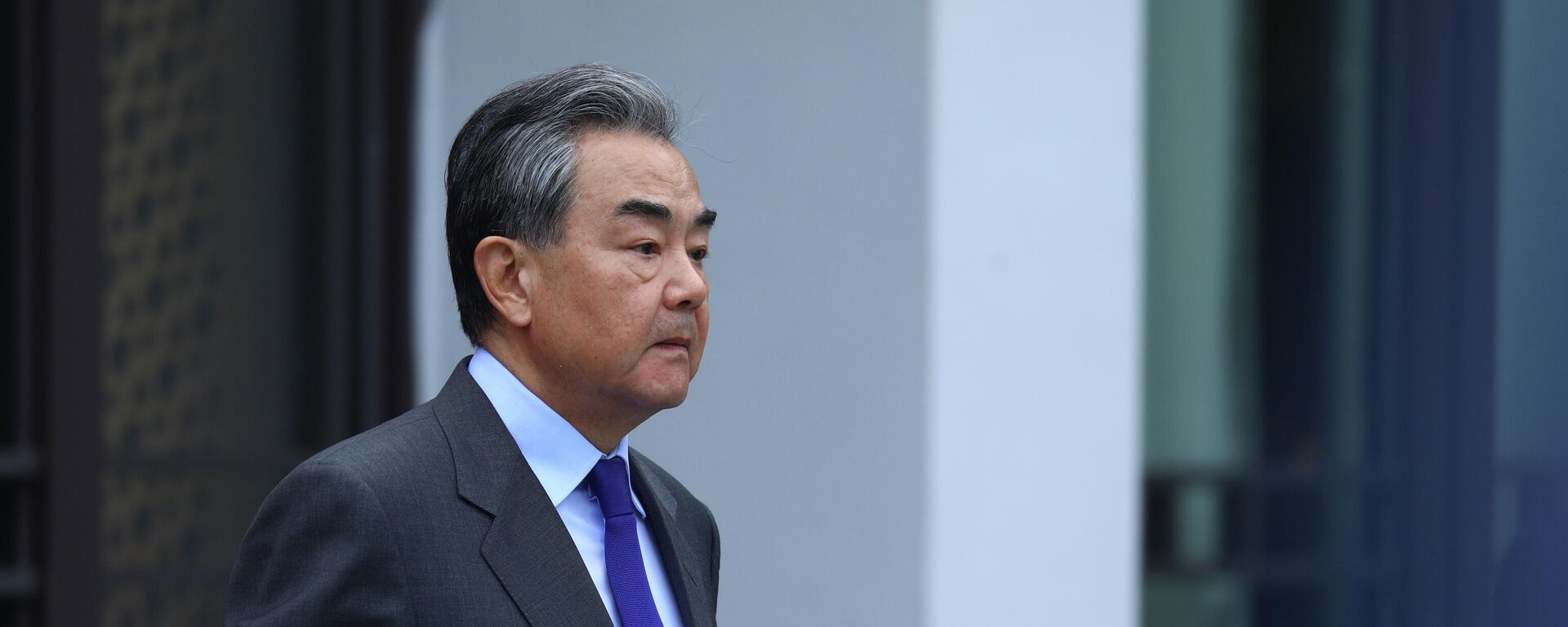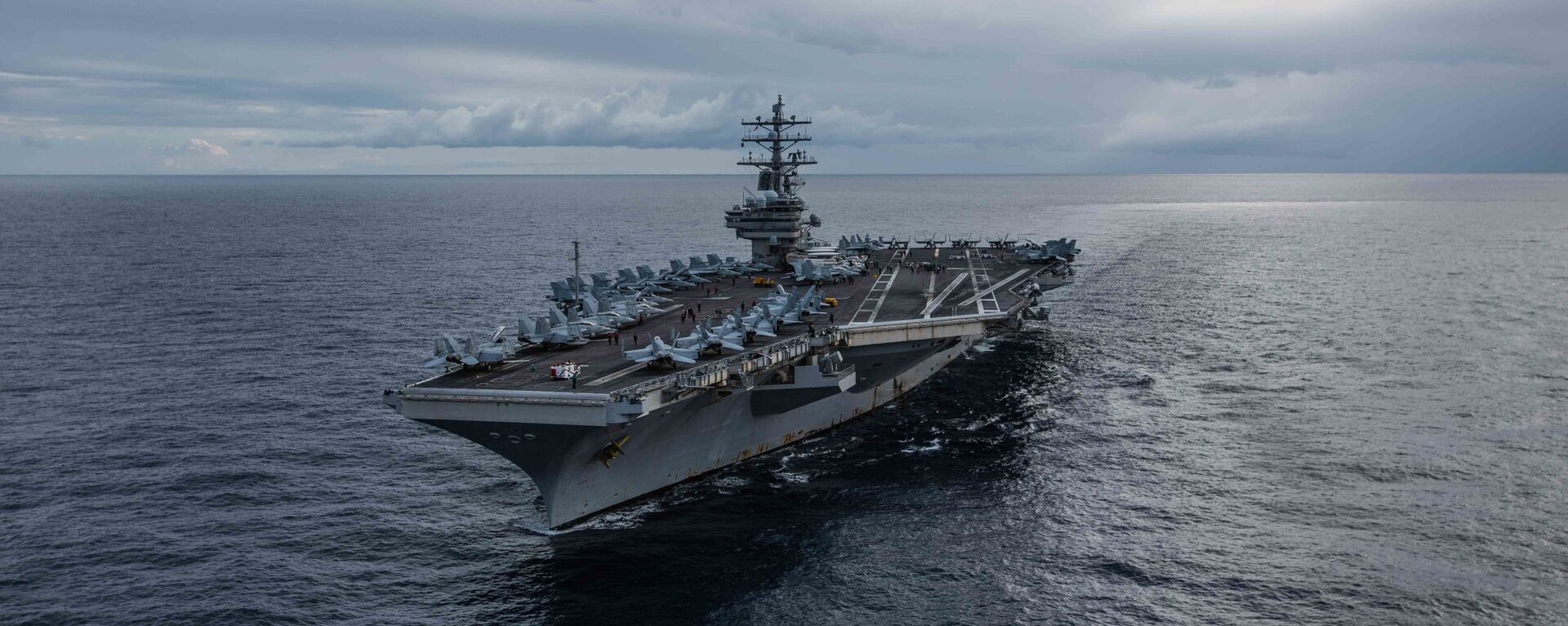https://sputnikglobe.com/20230811/chinas-wang-yi-warns-singapore-us-biggest-destabilizing-factor-in-the-world-1112542462.html
China's Wang Yi Warns Singapore: US 'Biggest Destabilizing Factor in the World'
China's Wang Yi Warns Singapore: US 'Biggest Destabilizing Factor in the World'
Sputnik International
The United States has cast Beijing as a villain in Southeast Asia, presenting itself as the defender of international law and the rights of smaller nations. However, Washington's solution to the disputes is a military standoff.
2023-08-11T19:30+0000
2023-08-11T19:30+0000
2023-08-11T19:30+0000
world
china
wang yi
singapore
asean
regional comprehensive economic partnership (rcep)
south china sea
tensions
us
https://cdn1.img.sputnikglobe.com/img/07e7/08/0b/1112542626_0:0:900:506_1920x0_80_0_0_380126b61f4c10e0a570c20b42908260.jpg
Speaking to Singaporean Prime Minister Lee Hsien Loong on Friday, Chinese Foreign Minister Wang Yi warned that one of the city-state’s biggest geopolitical partners, the United States, would be a never-ending source of chaos and instability.“The United States, out of its motive to maintain unipolar hegemony, is unwilling to see the development and revitalization of China and other emerging countries,” Wang told Lee.Wang is on a tour of Southeast Asia to buttress Chinese relations with Singapore as well as Cambodia and Malaysia amid a heated dispute with the Philippines over a contested coral reef in the South China Sea and an increased effort by Washington to woo regional powers away from Beijing.A day prior, Wang met with his Singaporean counterpart, Vivian Balakrishnan, reaffirming the two nations’ “mutual interest in furthering tourism and business flows, and air connectivity between China and Singapore,” as Balakrishnan’s office put it.Singapore and China are both part of the Regional Comprehensive Economic Partnership (RCEP), a massive trade pact that recently took effect. It includes roughly 30% of the world’s population and 30% of its gross domestic product, with more than a dozen nations included across East Asia and the Pacific, including all 10 members of the Association of Southeast Asian Nations (ASEAN).Deputy Prime Minister Lawrence Wong, with whom Wang also met, expressed his support for China’s interest in joining the Comprehensive and Progressive Agreement for Trans-Pacific Partnership (CPTPP). The 11-nation trading bloc was founded in 2018 and includes some of the same nations as RCEP, but also states like Canada, Mexico, and Peru, on the far side of the Pacific. The United Kingdom joined the CPTPP last month, becoming the first European Union member to do so.However, Singapore, a former British colony, also has close ties with the United States, from which it has acquired a significant part of its military inventory. Due to its economic power and strategic location at the Straits of Malacca and southern end of the South China Sea, Washington has put extensive effort into courting the island nation’s friendship in recent years.It’s a phrase that the US has invoked in response to Chinese claims over islands and sea lanes in the South China Sea, much of which overlap with the claims of other nations, and against which the US has postured as enforcing the 1982 United Nations Law of the Sea (UNCLOS) against violations. Ironically, the US has never ratified UNCLOS.Amid the US’ posturing, China and ASEAN have pushed closer to establishing a joint code of conduct for the South China Sea, which will govern their interactions and disputes in line with UNCLOS once it enters force. A working group meeting last month saw the partner states commit to producing a working document within three years.
https://sputnikglobe.com/20230809/wang-yi-to-visit-three-southeast-asian-states-after-south-china-sea-showdown-with-philippine-navy-1112491823.html
https://sputnikglobe.com/20230623/us-warship-to-visit-vietnamese-port-as-south-china-sea-tensions-brew-1111414200.html
china
singapore
south china sea
Sputnik International
feedback@sputniknews.com
+74956456601
MIA „Rossiya Segodnya“
2023
News
en_EN
Sputnik International
feedback@sputniknews.com
+74956456601
MIA „Rossiya Segodnya“
Sputnik International
feedback@sputniknews.com
+74956456601
MIA „Rossiya Segodnya“
singapore; wang yi; chinese foreign minister; south china sea
singapore; wang yi; chinese foreign minister; south china sea
China's Wang Yi Warns Singapore: US 'Biggest Destabilizing Factor in the World'
The United States has cast Beijing as a villain in Southeast Asia, presenting itself as the defender of international law and the rights of smaller nations. However, Washington's solution to the disputes is a military standoff, while China has voiced its desire for dialogue and mutually-beneficial relationships.
Speaking to Singaporean Prime Minister Lee Hsien Loong on Friday, Chinese Foreign Minister Wang Yi warned that one of the city-state’s biggest geopolitical partners, the United States, would be a never-ending source of chaos and instability.
“The United States, out of its motive to maintain unipolar hegemony, is unwilling to see the development and revitalization of China and other emerging countries,” Wang told Lee.
“On the one hand, it condones and supports the Taiwan independence forces relying on the United States to seek independence, trying to cross China’s red lines,” he said. “On the other hand, it tears away the pretense of fair competition and coerces other countries into unilateral protectionism against China. These perverse practices will only damage its own credibility, laying bare the fact that the United States has become the biggest destabilizing factor in the world.”
Wang is on a tour of Southeast Asia to buttress Chinese relations with Singapore as well as Cambodia and Malaysia amid a heated
dispute with the Philippines over a contested coral reef in the South China Sea and an increased effort by Washington to woo regional powers away from Beijing.
A day prior, Wang met with his Singaporean counterpart, Vivian Balakrishnan, reaffirming the two nations’ “mutual interest in furthering tourism and business flows, and air connectivity between China and Singapore,” as Balakrishnan’s office put it.
Singapore and China are both part of the Regional Comprehensive Economic Partnership (RCEP), a massive trade pact that
recently took effect. It includes roughly 30% of the world’s population and 30% of its gross domestic product, with more than a dozen nations included across East Asia and the Pacific, including all 10 members of the Association of Southeast Asian Nations (ASEAN).
“We will continue to explore ways to enhance our cooperation, including in areas such as connectivity, the digital economy and sustainable development,” Balakrishnan added.
Deputy Prime Minister Lawrence Wong, with whom Wang also met, expressed his support for China’s interest in joining the Comprehensive and Progressive Agreement for Trans-Pacific Partnership (CPTPP). The 11-nation trading bloc was founded in 2018 and includes some of the same nations as RCEP, but also states like Canada, Mexico, and Peru, on the far side of the Pacific. The United Kingdom
joined the CPTPP last month, becoming the first European Union member to do so.
However, Singapore, a former British colony, also has close ties with the United States, from which it has acquired a significant part of its military inventory. Due to its economic power and strategic location at the Straits of Malacca and southern end of the South China Sea, Washington has put extensive effort into courting the island nation’s friendship in recent years.
In June, US Defense Secretary Lloyd Austin visited Singapore as well, meeting with Wong to reaffirm their “robust and long-standing bilateral defense partnership” and “their shared vision for a free and open Indo-Pacific region.”
It’s a phrase that
the US has invoked in response to Chinese claims over islands and sea lanes in the South China Sea, much of which
overlap with the claims of other nations, and against which the US has postured as enforcing the 1982 United Nations Law of the Sea (UNCLOS) against violations. Ironically, the US has never ratified UNCLOS.
Amid the US’ posturing, China and ASEAN have pushed closer to establishing a joint
code of conduct for the South China Sea, which will govern their interactions and disputes in line with UNCLOS once it enters force. A working group meeting last month saw the partner states commit to producing a working document within three years.




